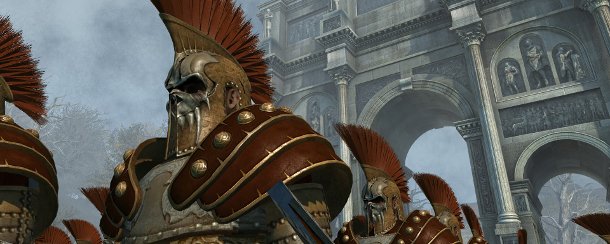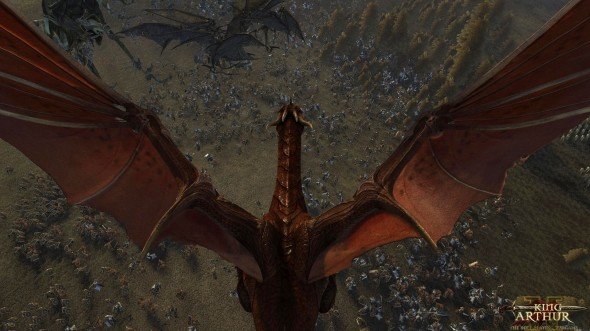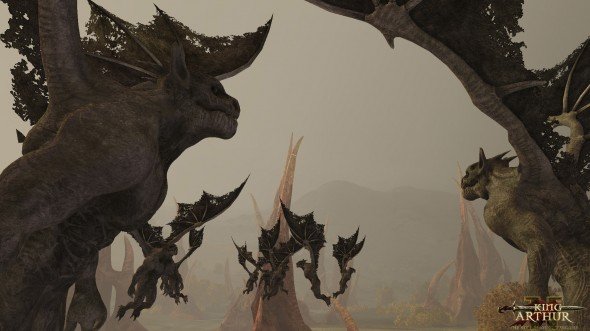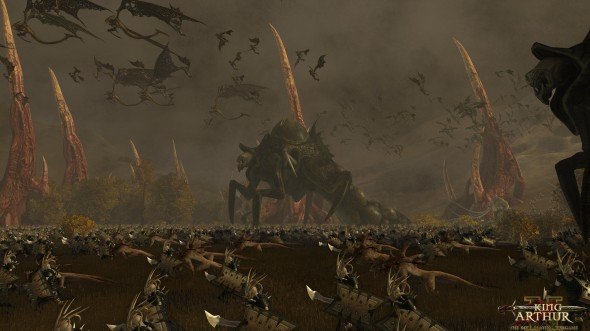King Arthur 2 preview

The witch queen of the Orkney Islands has given King Arthur a cursed wound that can never heal. Since Arthur shares a mystical connection with the land of Britannia, his pain is the nation's pain, a bit like how we all feel sad whenever Prince Philip talks. In Arthur's case, it blights the world to attack by really big monsters.
The original King Arthur: The Roleplaying Wargame took us all by surprise, wowing Tim Stone to the tune of 86% with a mixture of roleplaying and wargaming. Just like King Arthur, you wandered the British isles, getting into text-driven Choose Your Own Adventures. Also just like Arthur, you gained XP to clamber through a skill tree, and then hopped into battles where you were able to control your troops from a floating position in the sky. Think something along the lines of Fantasyland: Total War.

King Arthur II, confusingly, deals with the same King Arthur. The mechanics haven't changed much, either – its closest relation is still Total War. There's even a campaign map: a beautiful, expansive thing, picked out with intricate brushwork that gives it more character than Total War's functional views. Wander around on the campaign map, and you'll find quests. In any other strategy game, these would be basic battles, but the collision of RPG and RTS has turned them into little choose-your-own-adventure vignettes. The example the developer gave was familiar to any RPG player: Arthur rolls up, army in tow, to a village under demonic assault. Via text options, he can either choose to engage with the forces in the name of justice, engage with the forces in the name of getting paid by the surviving villagers, or sneak on by and leave the peons to their unearthly fate. But the game's focus on text-heavy RPG quests doesn't mean the giant, braintaxing battles of the first game are gone. They're very much still the focus.
In King Arthur II, those battles are now twice the size, with 3-4000 units able to take to the battlefield at once. You'll order your little medieval men to fight against cephalopodic giants, fire-breathing dragons and mountain-sized beasts. Just like Arthur did. And they'll keep coming. Arthur's pain has torn a hole in Britannia and the monsters that spill forth need to be quenched at the source. Smaller monsters make up enemy units to counter your own archers, infantry and cavalry in the field, but the larger creatures are bosses. You need a huge force and repeat assaults to bring them down.

In motion, these fights look beautiful. The game is as attractive as any Total War game short of Shogun 2, with the added bonus of mountain-sized beasts and spangly spell effects. But magic won't rule the battlefield entirely: spellcasters take a while to work up their juju, and introducing a lance to their face will stop them from finishing their incantations. Send your fastest riders along a clear path, and there's a good chance you'll score an interruption. If you do take the brunt of the magical energy, you'd better hope your units have a resistance to it.
You supplement your medieval men in their scraps with hero units. These supersoldiers can level up, and gain access to their own magical powers. These can be found down specific tech trees, and Arthur's own actions can influence their focus. Play nicely through the game's quests, choose the kingly option, and you'll be seen as 'rightful', and gain access to bonuses in lovely, just abilities. Go the other way and 'tyrant' it up over your underlings, and you get better at the evil, nasty stuff. Waver and hang in the middle, though, and you won't gain either. The lesson here is, if you're going to be a cruel, heartless ruler, at least commit to it. Religion has its own influence, depending on whether your Arthur is a staunch churchgoer, or a strip-naked-in-a-forest worshipper of the old gods. Both religion and morality are plotted on the same graph and dictate the upgrades: so you can roleplay an evil Christian, or a happy clappy tree-hugger king.

It's not just you and the monsters in the land of Camelot either. The countryside's spotted with bands of mercenaries and outlaws. These external factions can be smashed in the name of justice and overzealousness, or co-opted as useful, if morally dubious, allies. Their commanders – like the monsters' leaders – each have their own personality. Some like their armies to stand off and launch arrows, some prefer an entirely mounted force, others like to drown puppies, fashion them into necklaces and wear them into battle. The last one might be a fabrication, but they are monsters.
Keep up to date with the most important stories and the best deals, as picked by the PC Gamer team.
The biggest barrier to Total War taking over my life is the lack of a narrative over my actions. King Arthur II's melding of roleplaying and strategy, combined with its liberal stance on historical fact, means it's enticing me like few upcoming pure RPGS or RTS games are.

